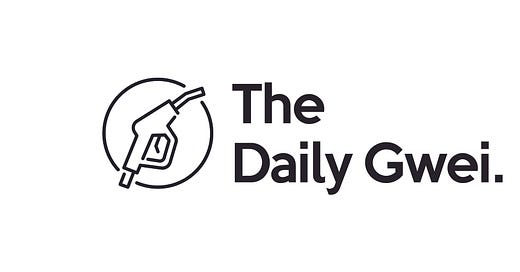Cut of Stake - The Daily Gwei #138
How I learned to stop worrying and love centralized exchange staking.
Centralization of staked assets on centralized exchanges has always been a worry for every Proof of Stake system and it is a valid and fair criticism. Though, I believe that the concern is overblown when it comes to Ethereum 2.0’s staking implementation for various reasons which I’ll outline in today’s piece.

As you can see from Justin’s tweet, exchanges hold a lot of ETH which means that they could potentially deposit this ETH into eth2 and make themselves 1/3 or 1/2 of the network. Kraken already makes up 10.7% of deposits though not all of their validators are online yet as only 900 validators (28,800 ETH worth) can enter the validator set of the Beacon Chain every 24 hours. There are other exchange staking services coming online over the next few months as well (Coinbase included).
In saying this, I think that exchanges attempting to attack the chain would mean death for their businesses. This is because the ETH that the exchanges control is not their own - they are customer deposits. If an exchange attacks the Ethereum 2.0 chain and gets slashed, it is their customers ETH they are losing. I’m sure I don’t need to go into the details of what this would mean for their business (especially for the exchanges based in the U.S). It makes much more sense and is a lot more profitable for the exchanges to just play by the rules.
Alright, so what if a nation state wanted to attack the network and didn’t care about losing money/their business or being slashed? Well first they’d have to acquire a large amount of ETH in order to become 33% or 51% of the network. If they wanted to become 51% of the network, they’d currently need to acquire 1.5 million ETH as 1.5 million ETH is already staked. This would cost them over $800 million at today’s prices and, unless they somehow found someone with 1.5 million ETH that wanted to do an OTC trade, buying this much ETH at once would increase the price dramatically - making it even more expensive for the attacker.
As a hypothetical, let’s say that this nation state was able to go the easier route and seize an exchanges funds which instantly gave them access to millions of ETH. Well, they’d still need to wait a long time in order to become the majority of the network as they can only activate a maximum of 900 validators per 24 hours (they’re also competing with other stakers so 900 is just the theoretical maximum - in reality, it’d be lower). Though, during this validator activation time, the ecosystem would surely notice this huge stake coming in and they’d be able to prepare to thwart/monitor this attack via various means.
You might be wondering, what if that nation state just seizes an exchanges validators and uses them maliciously? Well, again, we can fall back to the in-built mechanisms of Ethereum’s Proof of Stake such as slashing coupled with social consensus to fork out the attackers (essentially forking off the chain where the attacker has the majority). I do want to note that even though I make this sound easy, it certainly is not and would lead to disruptions for the Ethereum network (albeit it’d probably be fine over the long run). As a bonus, a successful recovery from an attack like this would still burn the attackers ETH (potentially millions) taking it out of circulation forever.
As you can see, attacking Ethereum’s Proof of Stake is quite difficult and requires a lot of capital (even if you’re a nation state). Even if you do succeed, you’re likely to get slashed and all of your ETH burnt which means you can’t just keep “spawn camping” the chain (as described by Vitalik here). In reality I believe the only entity that will ever seriously try to attack Ethereum and have a chance at “suceeding” will be a nation state - and we should be as prepared for that as we can be.
Have a great day everyone,
Anthony Sassano
Join the Daily Gwei Ecosystem
All information presented above is for educational purposes only and should not be taken as investment advice.





Great piece as usual, Anthony. I totally agree with everything you say.
IMO the one thing that would prevent nation states from ever wanting to attack Ethereum is their own interest. The more banks, corporations, and nation states use Ethereum for settling financial, commercial, and bureaucratic transactions, the more interested nation states will be in preserving Ethereum's health.
Nice thoughts.
I am not sure that nation states have the monopoly of power (or not for any longer).
Some private companies can have more than nation states.
In the future, some communities might also have more than nation states AND private companies (although the concept of nation state may have diverged at that point).